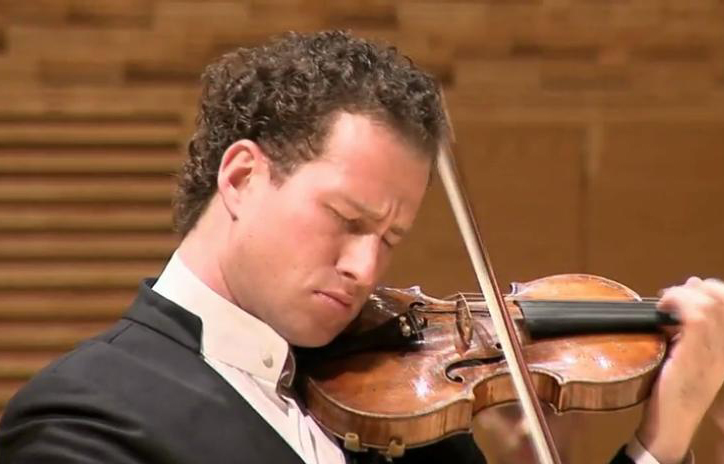by Mike Telin

I caught up with the violinist by telephone yesterday just after the rehearsal had ended.
Mike Telin: I hope the rehearsal went well. But this is a concerto you know quite well.
Nikolaj Szeps-Znaider: It did and it is. I’ve played it an awful lot — a wonderful awful lot. It’s one of the earliest pieces that I learned when I started playing.
It’s also one of those pieces that I don’t recall saying “I need a few years rest from it.” I’m always happy when it’s on the program.
MT: Why is that?
S-Z: There are wonderful composers and then there are masterpieces. And sometimes wonderful composers write masterpieces but not always. But in this case, it is a masterpiece by a great composer. It’s one of those works that even transcends the composer.
It’s a masterpiece in the genre of violin concerti. We have a handful of works where you think, there’s nothing more to say about this idiom. It’s a perfect violin concerto. What I mean by perfect is that its construction, its proportions, and power of expression are extraordinary, but completely in its own way. It’s not like Beethoven or Brahms but every bit as profound.
MT: You are a laureate of the Sibelius competition. And you won the Nielsen competition.
S-Z: Yes, Nielsen is another Nordic composer who wrote a terrific violin concerto that also transcends the composer. And like the Sibelius, it’s an original. You hear it and right away you know that it is Nielsen.
I admire that about composers, especially the ones that came after the great Germanic tradition of Beethoven, Schumann, Brahms. Of course you feel those roots in their music, but they completely find their own voice. And I love that about both Sibelius and Nielsen.
MT: This week Finnish conductor Klaus Mäkelä is on the podium. Have you worked with him before?
S-Z: I met Klaus in Lyon, where I am the music director. But this is the first time that we actually get to work together. We just had the one rehearsal, but it instantly felt the way that it should. What I mean by that is that it was unencumbered. There was never a “how do we manage this transition?”
I don’t want to call it a listening game, but it’s a listening exercise in giving and taking that hopefully creates the magic that everyone is looking for. That comes from the impulses given, in my case by the orchestra and conductor, and then accepting them. It’s a wordless dialogue. But that’s where the potential magic lies.
MT: You’ll be back in Cleveland next season as a guest conductor.
S-Z: I don’t feel old with age, but I have found that as I get older what I appreciate more and more are relationships. So it’s not just about coming and playing or conducting, it’s about building relationships with orchestras that means something to me.
Such as the relationship that I have been fortunate enough to forge with The Cleveland Orchestra — intensely over the last fifteen years. It is also the orchestra that I made my North American debut with at Blossom in — hold on to your hat — the late 1990s. So it is a special place for me and to have a relationship where sometimes I play and sometimes I conduct feels very organic.
MT: Listening to you, I get the sense that you separate the two very well.
S-Z: They are separate. But what remains the same is the act of music-making. This is something I realized even before I started as a professional conductor. I remember being at a summer school when I was much younger. It was a week-long academy and I was playing chamber music, teaching, I played a concerto with the student orchestra, and I conducted. And I remember at the end of the week thinking, ‘My gosh, there really is no difference between these things.’ It’s still the act of music-making, the act of sharing.
MT: I think people who are composer/player/conductors have more interesting perspectives.
S-Z: You’re touching on something that I think is very important, which is that conducting, of course, is a craft, a profession, and it’s very much a profession to be learned and respected. But as a conductor you are removed from the physical act of making the sound — you no longer are in a direct relationship with sound.
But with very few exceptions, every “great” conductor has several musical alleys — they compose, perform, and conduct. Something needs to inform the musicianship beyond the craft of conducting. But conducting must be respected as a craft, as something to be learned.
Published on ClevelandClassical.com April 21, 2022.
Click here for a printable copy of this article


